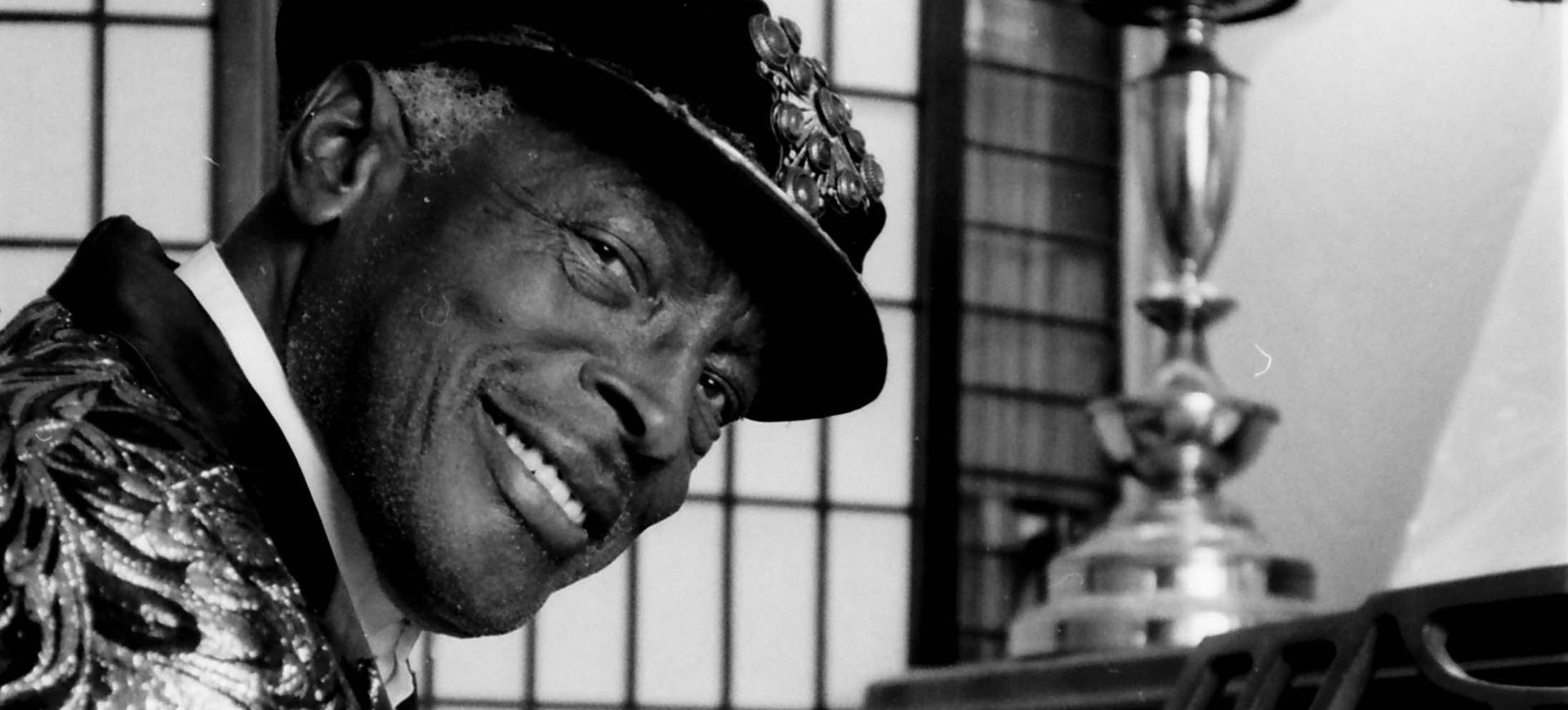The great, irreplaceable Charles Brown, born in Texas City, Texas in 1922, died in Oakland, California in 1999 aged 76. One of the most important and influential of blues musicians – Percy Mayfield, Floyd Dixon, Ivory Joe Hunter, Johnny Ace all acknowledged his influence.
Here are some memories of working with Charles when he played a week at Ronnie Scott’s in Birmingham, taken from the book “Don’t Worry ‘Bout The Bear” written by Jim and Ron Simpson. . .
Ray Charles said that Charles Brown was the inspiration for his choice of stage name and Nat ‘King’ Cole wrote that Charles was his main influence. Check out Nat’s early recordings where he sounds uncannily like Charles Brown. It was a real coup to book Charles Brown into the Birmingham club for a week, the only UK dates he was to play, and I was determined to make the most of it.
Charles had long been a particular hero of mine and I had always been amazed – and still am – how little he seemed to be known, even amongst musicians. I pulled out all the stops and cashed in every favour I could with the media, so we pretty much got the local and national coverage that Charles deserved.
Blues fans came to the city from Newcastle, Southampton and Exeter – one couple from Cardiff checked into a neighbouring hotel and came in for three nights. Charles was magnificent, his performances riveting and his band on the button. Personally I had a week to remember. I had met Charles Brown the previous year when he played the Notodden Blues Festival in Norway and I was there with King Pleasure and the Biscuit Boys.
The first morning of the festival, I was taking breakfast with Buddy Guy and the room was full of American bluesmen when Charles made his entrance. Almost as if rehearsed, the room erupted into a spontaneous version of Charles’ hit single, Merry Christmas Baby, with Buddy Guy and Junior Wells leading the way.
It was extraordinary to see the respect and affection these blues stars, some of them gnarled veterans, had for Charles which makes it even more surprising that he was never a household blues name. The Norwegian promoter introduced me to Charles who gestured towards Buddy and Junior and grunted, ‘These boys bothering you?’
I went to his rehearsal that morning with Biscuit Boy Al Nicholls. We were bowled over by the immediate change in Charles’ demeanour from amiable and jocular companion to ultra-strict disciplinarian. Where music was concerned, Charles knew exactly what he wanted from every musician, but he was equally exacting when it came to presentation. Ruth Davies, the attractive bass player, looking all the more feminine in a man’s dinner jacket, came in for a tonguelashing, even though this was just a rehearsal, for not appearing to be totally involved; to Charles every time you played, you put on a show.
‘Don’t take your eyes off me, bitch,’ Charles demanded. ‘Look like you’re madly in love and can’t wait to get me home!’ The fact that Charles was famously gay somehow made it all the more ironic.
During the Birmingham run Charles and I laid plans to record him for Big Bear which we did at Chipping Norton Recording Studios, the residential studio owned and operated by Mike and Richard Vernon of Blue Horizon Records fame. Again, once in the studio, Charles became a changed man.
Joking and story-telling throughout the journey to Chipping Norton, much to the delight of Val Wiseman and myself, before I had even put the handbrake on he leapt out of the car, bounded up the studio steps, demanding, ‘Where’s the guitar player?’ He grabbed the instrument from the hands of Bullmoose K. Shirley, saying, ‘This is what I want you to play’ – all before the introductions had been made!
The album, Blues and Rhythm Revue Volume 1, featured King Pleasure and the Biscuit Boys with guests Charles, fellow Americans Gene ‘Mighty Flea’ Connors and Howard McCrary and the always stunning Val Wiseman. It proved to be one of the most satisfying sessions I ever produced. Charles was simply Charles Brown and you can’t get better than that.
I had persuaded Charles to revive his lengthy and eloquent piano introductions, asking him to give me a ‘Charles Brown Symphony’, a phrase which he adopted and used for years. His version of the classic Fool’s Paradise was a showstopper. A year later he sent me a CD inscribed, ‘To Jim Simpson who is so influential in getting myself back to my roots and public.’ I rather treasure that.
In the build-up to Charles Brown’s week at Ronnie Scott’s club owner Allan Sartori, who had a malicious sense of humour, delighted in referring to him as Charlie Brown which to my eternal shame I rose to nearly every time. Allan’s lack of respect for musicians always got me going, but sneering at Charles was a step too far, especially as Charles delivered six straight sell-out nights at his club.

